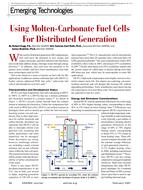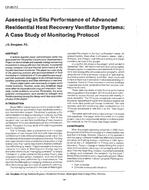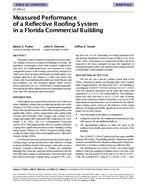In this study, an analysis has been conducted to estimate the potential benefits of integratingaphotovoltaic thermal collector (PV/T) with a two-stage variable capacity air-source heat pump (TS-VCASHP) in aToronto and Region ConservationAuthority (TRCA) archetype sustainable house (ASH) in Toronto. A comprehensive analysis has been conducted to predict the effect of PV/T system arrangement configurationNS ×NR (number of PV/T systems in rowsNR and seriesNS), air mass flow rate and duct depth on thermal energy production, electrical energy production, heat-pump coefficient of performance (COP), electricity consumed by the heat pump, and overall PV/T system efficiency. It was found that COP could be increased from 2.74 to a maximum value of 3.45. The results show that the heat pump electricity consumption for heating purpose was reduced by 20.2% with combining PV/T systems with air-source heat pumps. The maximum achieved system efficiencies for the arrangements 5 × 3, 5 × 4, and 5 × 5, with total mass flow rate of 1.2 kg/s (2.64 lb/s)were54%,50%,and47%,respectively.For the same total number of PV/T panels used in one array and same total mass flow rate, it is better to haveNS greater thanNR in order to produce more thermal energy. This consideration has slight effect on the total electricity production. It is found that the amount of electrical energy produced from each PV panel depends on the panel position in a row. The first PV panel has the highest efficiency (14.16%) and produces 763Wh(2603 Btu/ h) of electricity, while the fifth PV panel has the lowest value of efficiency (14.06%) and generates 756Wh (2580 Btu/h) of electricalenergy.
Product Details
- Published:
- 2014
- Number of Pages:
- 13
- File Size:
- 1 file , 5.3 MB
- Product Code(s):
- D-NY-14-014
- Note:
- This product is unavailable in Russia, Belarus


